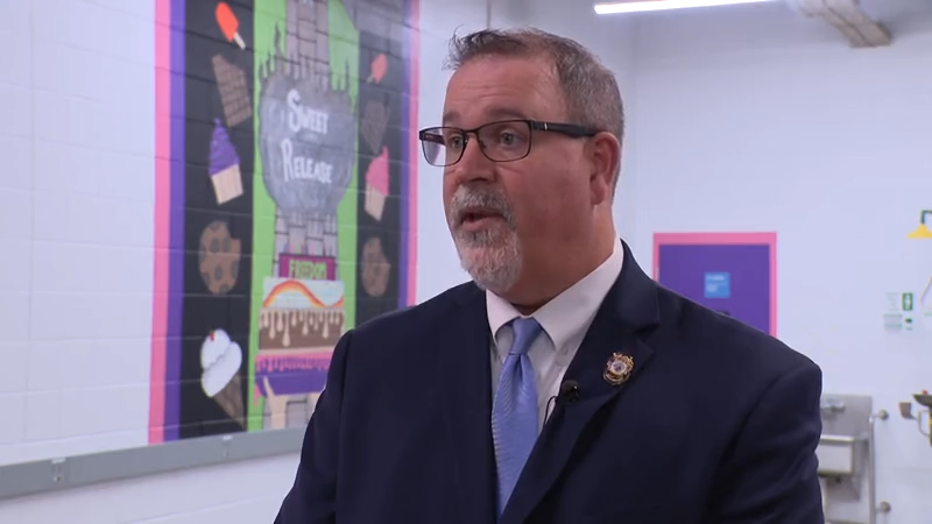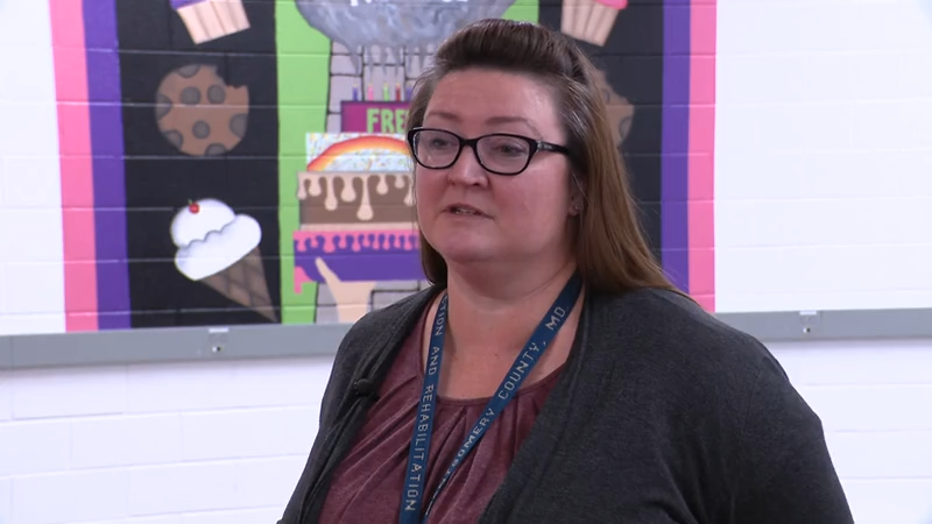Baking behind bars offers a fresh start for inmates at Maryland correctional facility
'Sweet Release' program teaches inmates baking and life skills
Some Montgomery County inmates are getting real-life skills for when they are released in the DOCR's Sweet Release Job Training program. Participants bake bread, cakes, cookies, and more for over 800 inmates and officers.
BOYDS, Md. - Deep within a Maryland jail, a group of inmates are choosing to rise above their pasts, transforming simple ingredients into sweet possibilities, and baking their way toward a future sprinkled with hope.
The "Sweet Release" Bakery Job Training Program inside the Montgomery County Correctional Facility (MCCF) in Boyds, Maryland is now in its seventh month after being reinstated by Montgomery County Executive Marc Elrich. Participants learn professional baking skills to prepare them for life after incarceration.

Ben Stevenson, the director of the Department of Corrections and Rehabilitation, discusses the new "Sweet Release" Bakery Job Training Program.
During a recent visit, Ben Stevenson, the director of the county’s Department of Corrections and Rehabilitation, told FOX 5 the program’s goals are clear: "We’re not just making desserts. We’re giving inmates a chance to learn skills, build confidence, and prepare for employment after they leave."
Incarcerated individuals spend eight weeks learning to bake bread, cakes, cookies, and pies. The training includes practical lessons in measuring and mixing ingredients, operating professional kitchen equipment, and food safety. Graduates earn ServSafe Food Handler’s Certificates, a valuable credential in the food service industry.
"It’s been a slow start, but we’re working on expanding our network to help inmates secure jobs once they graduate," Stevenson added. "It’s a process, but we’re committed to giving them the tools they need."
Frederick Abello, the facility’s warden, underscored the value of the program in changing inmates’ lives.
"A person that’s incarcerated needs to have something to do. This gives them a sense of purpose and something to be proud of," he says. "When they make these products and see how others appreciate them, it boosts their self-esteem. We’ve even had officers joke about how hard it is to button their uniforms because they keep eating the bakery products!"
Ron Cox has been inside the correctional facility since July 24. He says the program has changed his perspective. "This gives me a routine and a sense of accomplishment. I didn’t know I could enjoy something like this," Cox said, as he carefully portioned dough onto a baking tray.
The bakery operates like a commercial kitchen. Inmates wake up at 4 a.m. to work with industrial mixers, digital scales, and cookie cutters while following strict security protocols. Knives are locked down and rarely used. They must prepare the goodies for the general population, over 800 people.
Jonathan Grimes has been in custody since February. He finds the work rewarding, as well.
"I’m learning a lot here, not just about baking but about discipline and teamwork," Grimes said. "This program is helping me see a future where I can do something productive."
Both Mr. Cox and Mr. Grimes are currently detained at the MCCF in a pretrial status, and are being held without bond pending upcoming court processes.
Bakery manager Ava Givens says the program also helps with morale.
"The holidays are tough in here," she explained. "This program gives inmates something to focus on and a way to contribute positively."
The bakery’s holiday preparations are in full swing. This Christmas, inmates will enjoy red velvet cake and sugar cookies baked by their peers.
Officers at the facility can also look forward to the treats — in addition to the M&M brownies and cherry oatmeal cookies — in their dining hall.
"We’re also trying to build a network with bakeries on the outside," Abello said. "We want the inmates to be able to leave here and walk straight into a job in the food service industry."

Deputy Warden Kendra Jochum has been with the DOCR for nearly 27 years.
Deputy Warden Kendra Jochum, who oversees the program’s development, shared her pride in the program’s impact.
"The most rewarding aspect is graduation day. It’s the culmination of all their hard work, their bumps along the way, and the success they feel when they share their favorite dessert with others," she said. "It’s a moment of pride and accomplishment for them. For many, it’s the first time they’ve ever received that kind of positive recognition."
While inmates who graduate from the program do receive a certificate that allows them to pursue careers in food service, so far no former participants have found work in the food service industry yet. The program’s restart is paving the way for future opportunities.
"We are also in the process of adding new programs, like a vegetable garden and a composting initiative, to further develop the skills of our inmates," Abello added. "We want to offer a full-circle experience that provides them with the tools to rebuild their lives."
One of the most visually striking aspects of the program is a mural painted by the inmates, which is displayed in their classroom. The mural depicts a prisoner’s journey from incarceration to freedom, illustrating the hope and transformation that the program aims to provide.
"The mural symbolizes their vision of freedom, both within the institution, and after they are released," Jochum said. "It’s their way of expressing what they’re working toward, and it serves as a powerful reminder of their potential for change."
As the "Sweet Release" program continues to evolve, MCCF remains committed to offering inmates like Grimes and Cox a second chance.
"This is a lifeline," Grimes said. "It’s showing me that I can do better when I’m out. My family can’t wait for me to make them a home-cooked meal."

